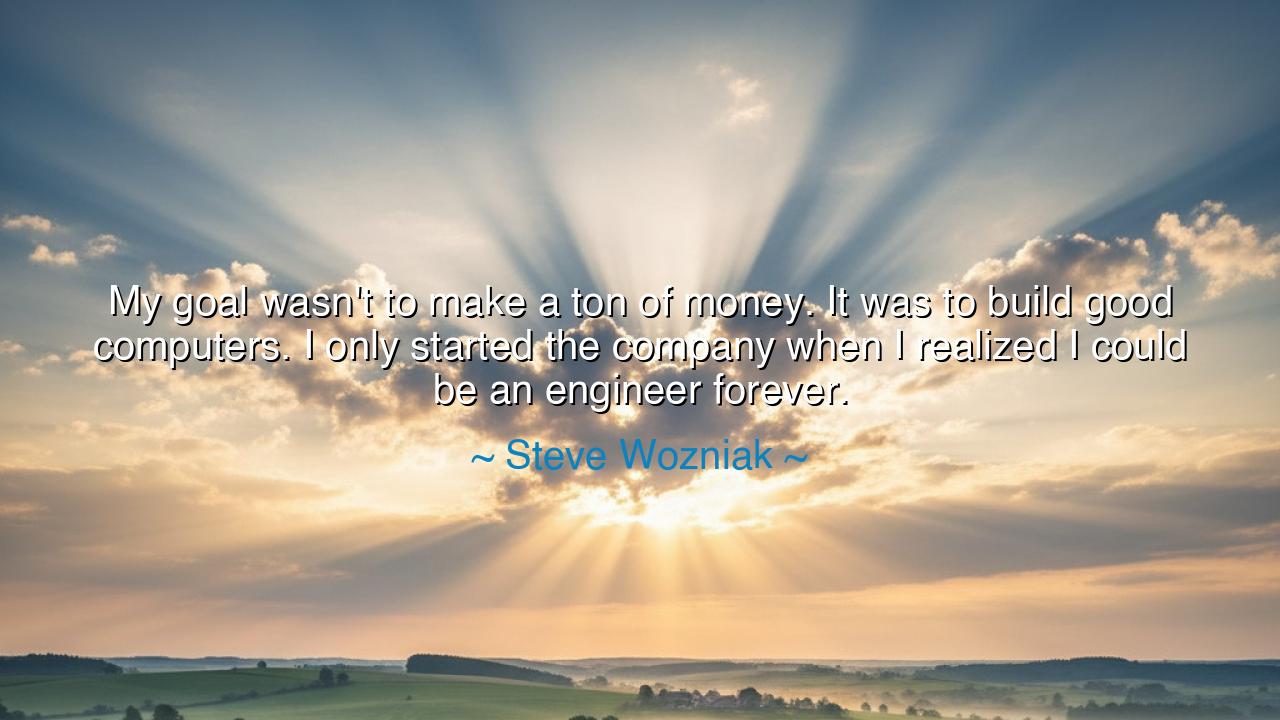
My goal wasn't to make a ton of money. It was to build good
My goal wasn't to make a ton of money. It was to build good computers. I only started the company when I realized I could be an engineer forever.






There are words that shine not because of their grandeur, but because of their purity — words that spring from a heart untainted by greed, from a spirit that finds joy not in possession, but in creation. Such are the words of Steve Wozniak, who once said: “My goal wasn't to make a ton of money. It was to build good computers. I only started the company when I realized I could be an engineer forever.” In this confession lies the soul of the true creator, the one who builds not for glory or wealth, but for the sheer love of shaping the world with his hands. His words are not merely a statement of purpose; they are a hymn to craftsmanship, a reminder that meaning in life is found not in accumulation, but in devotion to one’s work.
The meaning of this quote flows from a deep well of integrity. Wozniak, co-founder of Apple, speaks here not as a businessman, but as an artist of technology, a craftsman who sought beauty and harmony in circuits and code. He reminds us that creation is sacred, that the act of making something excellent — whether a machine, a melody, or a poem — is in itself a reward greater than any profit. The world, he suggests, belongs not to those who chase riches, but to those who chase excellence. True satisfaction comes when one’s labor becomes an expression of the soul — when one’s craft and calling are one.
The origin of these words lies in Wozniak’s journey during the dawn of the digital age. Long before Apple became a titan of industry, there was only a young engineer working through the quiet hours of the night, soldering and programming with the wonder of a child and the discipline of a master. While others dreamed of money or fame, Wozniak dreamed of simplicity, of making computers not cold instruments of industry, but companions of creativity — machines that ordinary people could understand and use. He and Steve Jobs began their venture not from a tower of wealth, but from a humble garage, where ideas burned brighter than ambition. It was there, amid the smell of metal and wire, that Wozniak realized he could remain forever an engineer, forever a dreamer shaping reality through invention.
In spirit, his words recall the teachings of the ancients. The Greek philosopher Aristotle spoke of “eudaimonia” — the highest form of happiness, found not in pleasure or wealth, but in the fulfillment of one’s purpose. So too did the craftsmen of old — the sculptors, the builders, the blacksmiths — find joy not in the selling of their art, but in its making. They knew, as Wozniak did, that the truest kind of wealth is mastery. The gold of the spirit is not counted in coins, but in the moments when one loses oneself in creation, when time vanishes and only the work remains.
Consider the story of Antonio Stradivari, the legendary violin maker of Cremona. His instruments, now priceless, were born not from the pursuit of riches, but from an obsession with perfection. Stradivari spent decades refining his craft, shaping wood until it seemed to breathe music. He died without great wealth, yet his work has outlived empires. Like Wozniak, he built not for fortune, but for beauty. Both men understood that the hand that builds with love leaves behind creations that endure beyond time, beyond death.
Wozniak’s words also hold a quiet rebellion against the modern obsession with profit. In an age where success is measured by numbers, he reminds us that purpose is a higher measure. A man who builds only for money will tire when the market fails him, but a man who builds for joy will never cease. His love for engineering — the process of creation — became his compass, his temple, his freedom. By anchoring his life not in wealth, but in passion, he discovered what so many forget: that happiness is not something to be bought, but something to be built.
And so, the lesson is clear: find what you love, and let it become the work of your life. Seek not the rewards that fade, but the fulfillment that endures. Whether you are a maker of machines or a writer of words, let your goal be to build well, to serve truth, to create with heart. The world will always chase speed and profit, but the wise will chase mastery and meaning. Be among the latter.
Thus, O listener, remember Steve Wozniak’s quiet wisdom: that the greatest freedom is to labor at what you love, that the greatest success is to remain true to your craft. When you build for passion rather than profit, your work becomes immortal — for it bears the mark of sincerity, the echo of your soul. Let your purpose, not your paycheck, be your measure. For those who live as creators, not as merchants, will find that even in a world of machines, the human heart remains the most powerful engine of all.






AAdministratorAdministrator
Welcome, honored guests. Please leave a comment, we will respond soon